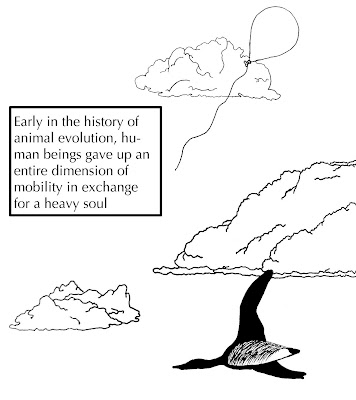
"As living information the plasmate travels up the optic nerve of a human to the pineal body. It uses the human brain as a female host... in which to replicate itself into its active form"
--Philip K. Dick
VALIS
Information perpetuates itself the same way viruses do, using living organisms as hosts, and
diffusing hierarchically. Once we become infected with a particular idea, it makes a nest for itself in our thoughts, reproducing and occasionally mutating until it can find a new host.
The idea reproduces by sending out reproductions of the original information contagiously to the people we come in contact with--either directly, through academics or conversation, or by creating new hosts for this idea through books, films or other boxes of representation.
The lifespan of ideas is much longer than that of physiological viruses; in an individual this spans anywhere from a couple of years to one's entire lifetime, depending on the strength of the idea. In social or cultural organisms (i.e. nations, civilizations) strong ideas have been known to last well over a hundred years (i.e. Romanticism, Protestantism).
College is in this sense a sort of anti-hospital, in which we purposefully infect ourselves with the hope that these ideas may perpetuate and transmit themselves through us into new forms.
There are very few ideas that are benign--accepting an idea into one's system rarely has a nil effect on the host. Whether that idea be feminism or Reaganomics, when the idea has matured into its adult form (capable of reproduction), it will incorporate itself into the full being of the host, including his actions. Some ideas have been known to be fatal (such as suicide, cigarette commercials [now an extinct form], or daredevilism).
It is possible to build up resistance to certain ideas by purposefully vaccinating oneself with an idea that is mutually exclusive with the target idea if an exposure can be predicted beforehand, such as reading Emmanuel Levinas before reading Friedrich Nietzche. Likewise it is possible to nourish an idea by frequent exposure to compatible or complementary ideas, which is why soda machines and snack machines are usually juxtaposed geographically. They are built as cellular agents for the idea of stimulating the taste buds and the idea of microconsumerism. (Man, I could go for a Snickers bar right now. Oh wow, Skittles! I haven't had those in so long. Crap, now I need something to wash all this down with).
The International Committee on Taxonomy of Viruses lists these criteria for a virus:
1. Viruses arose from non-living matter, separately from and in parallel to other life forms.
2. Viruses arose from earlier, more competent cellular life forms that became parasites to host cells and subsequently lost most of their functionality*.
3. Viruses arose as parts of the genome of cells that acquired the ability to "break free" from the host cell and infect other cells.
*This can be read as
previous functionality, as in "I can no longer function as an Objectivist after being infected with the idea of Keynsianism"
[Post Script: About half a day after publishing this post, I remember that this is exactly the premise of Richard Dawkins'
The Selfish Gene. Damn]






